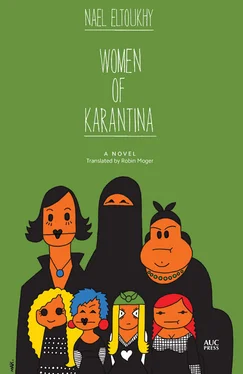Lara was supportive. She told her the tale of Nadia and Itemad. She said that Nadia and Itemad had been two women, sure, but that hadn’t prevented them achieving a great deal. Were it not for their husbands’ treachery they would have gone on working for years and years. The sisters were silent; then Lara said, Do you think Yehya might betray us? Yara returned her gaze to the window and said, Betrayal’s written in the stars. I just pray to God that he’ll come to his senses. The thought occupying Yara was that Yehya had become a full-blown alcoholic. That he couldn’t live without the booze.
The lesson they took from Nadia and Itemad’s tale was that Yehya Volcano should be sidelined, in view of the fact that he was incapable of managing the war, and because, were he to become capable, he would promptly betray them just as Nadia and Itemad’s husbands had done. In circumstances such as these, caution was a duty. Yara and Lara went down into the tunnel without him, they went down again and again and again, and on each visit they would meet other men, all fit to run the war. The same man occurred to both sisters simultaneously: Afriqi. A guy in his late twenties. Witty, handy with a gun, a natural leader. Lara sat with him. She said, We want you, Afriqi. We want you to be our right-hand man. What about Yehya Volcano? he asked her. Her reply, to the letter: Forget about Yehya Volcano. He’s only your leader because we allow it, and we want you to be leader now.
Alcohol is bad. No coincidence that Our Lord, may He be praised and glorified, describes it as the mother of all mischief. We’ve seen it destroy Hamada in previous decades, and now we are watching it destroy Yehya Volcano. Yehya Volcano spends all his time sitting with his friends and drinking, only rarely venturing down into the tunnel, his pocket fat with cash from a number of little schemes he’s got running belowground, from hard candy, falafel sandwiches, and automatic weapons all the way through to the stolen hours of pleasure in the train carriage he rents out to the men and their women. The cash never leaves his pocket. He drinks and gambles and his business takes care of itself. But this has its dangers — above all, to his image. He was spotted puking in a darkened street in Bahari, and he was spotted lying on the sidewalk in Abu Suleiman, unable to get up. Yara’s heart is being torn apart.
She tried talking to him, and he spat on the floor and went to bed. When she went after him he slapped her face. Yara was pregnant. With his child in her belly, the blow filled her with pain. Yara was storing everything away. She didn’t forget.
No one had a clear idea of what was going through Yehya Volcano’s mind back then. Did he feel that the empire he’d built by force of arms was on the verge of collapse? Did he feel revolted by himself, or was it the other way round? Was he proud? No one knew. The byways of Yehya’s psyche were hard to access, particularly if we take into account his poker face and clipped speech. But we can deduce that he spent each day tormented by the contemptuous expressions with which many people had started to greet him and which he was unable to meet. He was impotent. His speech was as it always had been, ditto his expression; the difference was that he was now unable to do anything. Even after he learned that his wife and her sister had turned to Afriqi to lead the battle beneath the earth, he couldn’t summon even a single word of reproach. He only asked her, as they lay in bed together: So is Afriqi in charge of the tunnel now? She nodded coldly, and he turned his face away and switched out the light.
The days that followed saw a severe decline in conditions down in the tunnel. For two whole days Amira’s men kept up a steady stream of fire. The men were exhausted. Many were wounded, some died, and they were forced back some meters; meters that Amira’s men soon occupied. Afriqi dined with Yara and Lara in their apartment, and told them that the response would be harsh, and indeed, the tunnel was to tremble from the assault of Yara and Lara’s men upon Amira’s. Molotov cocktails lay strewn on every side; shell casings, empty cartridges, slingshots. Yara’s men managed to reclaim the few meters they had lost and Yara’s faith in Afriqi grew. She gave him greater powers and she and her sister formally declared him to be their military commander down in the tunnel in place of Yehya Volcano, who at that very moment was retching in the street like a dog.
None of this took place in isolation. The eyes of the whole world were locked on Karantina and its feuds. Media interest in the city began when an American journalist visited Karantina. With her cell phone she managed to capture images of the war in the tunnels, and she sat down with Yara and Lara, Amira and Yehya Volcano to conduct interviews with them in her flawless Palestinian-accented Arabic. Her five-page article on the city was published by The New York Times with the headline “Alexandria: The Story of Seven Women Who Rule the World,” and opened, thrillingly: “Even as man digs down to the very core of our planet, to the center of gravity itself, Egypt is not far behind. While major world powers such as Argentina, China, and the United States fight for possession of Earth’s bowels, Egyptians are conducting their own, remarkably similar feuds.” The report included pictures of Yara and Lara, Inji, Minnatallah, and Amira, with a biography of each and an explanation of their role in the story. Also included was a little box of text that recounted the tale the city’s inhabitants told — its historical accuracy unverified — of two woman who took up prostitution and killed their customers, two women who went by the names of Nadia and Itemad. A second page displayed pictures from the tunnel and talked about the juvenile fighters who carried out the orders of their female bosses. The report struck the Arab media like an earthquake. Correspondents descended on the region in droves. A few Arab channels managed to broadcast short documentary films on Karantina before access was denied. Local residents grilled strangers about what they wanted and searched them top to toe.
Entering the neighborhood was nigh on impossible now, forcing the state media to use its imagination to try and fill the gaps in the story told by The New York Times and the Arab satellite stations. For instance, what could all those men and women be getting up to down there if not sex? What on earth were the neighborhood’s residents doing, if not carrying out some fiendish plot to smear the reputation of the Bride of the Mediterranean? Enraged, one journalist wrote about Devil-sent creatures, who had snuck unnoticed into our world to wreak havoc on our lives, while the Egyptian state was busy “developing” the South. Well! One fine day we would realize that they had laid to waste decades and decades worth of work to revive the city that had once been a beacon of learning and liberation to the entire Orient. Another drew attention to a peculiarity shared by the seven women: that they were all ugly, a look of terrible evil in their eyes, including that one in the niqab (he was referring to Inji) who appeared to be their leader, the one who pulled the strings.
All of which had its effect on the collective consciousness of Egyptians. Alexandria became synonymous with the bestial epithets applied to its inhabitants. One cartoonist specialized in depicting Alexandrians with tails; another always colored them green. An anthropologist wrote the following of the Alexandrian character: “The Alexandrian is an individual who loves blood and violence. War drums are sweeter to his ear than the delicate strains of classical music and guns dearer to his heart than hymns to peace. By his nature, the Alexandrian only appreciates jokes told against his enemies, and can only enjoy works of art that belittle others and glorify himself. There is no one cause around which Alexandrians are united, no principle that inspires them all. Indeed, one might say that every Alexandrian has a cause and principle that is his and his alone. It is their blind and bloodthirsty fanaticism for all these various causes and principles that unites them. Reports from psychologists’ clinics inform us that Alexandrians suffer from sadomasochism, an illness in which delight in torturing the self and the other are evenly matched. Of course, we have no desire to engage in sweeping generalizations. We have no doubt that there exists a minority of decent Alexandrians whose voices are most unfortunately swamped by the barbarous, vengeful, and primitive hordes.”
Читать дальше












